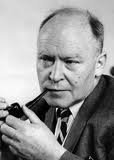The Carl-Gustaf Rossby Research Medal

Description
The Carl-Gustaf Rossby Research Medal is presented to individuals on the basis of outstanding contributions to the understanding of the structure or behavior of the atmosphere. It represents the highest award the Society can bestow upon an atmospheric scientist.
Nominations are considered by the Atmospheric Research Awards Committee, which makes a recommendation for final approval by AMS Council.
Nomination Process
Thank you for your interest in submitting a nomination! AMS membership is not required to submit an award nomination. Nominations are due by 1 May. The nominator is responsible for uploading the entire nomination package.
Requirements
- citation (25 word maximum)
- bibliography (if appropriate) (3 page maximum)
- nomination letter (3 page maximum)
- nominee Curriculum Vitae (if appropriate) (2 pages maximum)
- three (3) letters of support (2 page maximum each)
Carl-Gustaf Rossby 1898-1957
Born in Stockholm in 1898, Carl-Gustaf Rossby was a pioneering meteorologist who first explained the large-scale motions of the atmosphere in terms of fluid mechanics.
In 1925, Rossby, who had been a student of Vilhelm Bjerknes, and worked on the development of the concept of the polar front, was granted a fellowship from the Sweden-America Foundation “to study the application of the polar front theory to American Weather.” While working on this at the US Weather Bureau in Washington, DC, he also participated in the establishment of the first weather service for civil aviation.
Throughout the 1930’s, Rossby held academic and research appointments at the Massachusetts Institute of Technology (MIT), the Woods Hole Oceanographic Institution (WHOI), the US Weather Bureau, and the University of Chicago, where he turned his attention to the understanding of large-scale atmospheric motions. He identified and characterized both the jet stream and the long waves in the westerlies that were later named “Rossby waves.”
During World War II, Rossby organized the training of military meteorologists to support allied operations. After the war, many of these scientists worked with him to develop mathematical descriptions of atmospheric dynamics and establish methods and models for numerical weather forecasting as large scale computing came into use.
Carl-Gustaf Rossby was president of the AMS 1944-45.